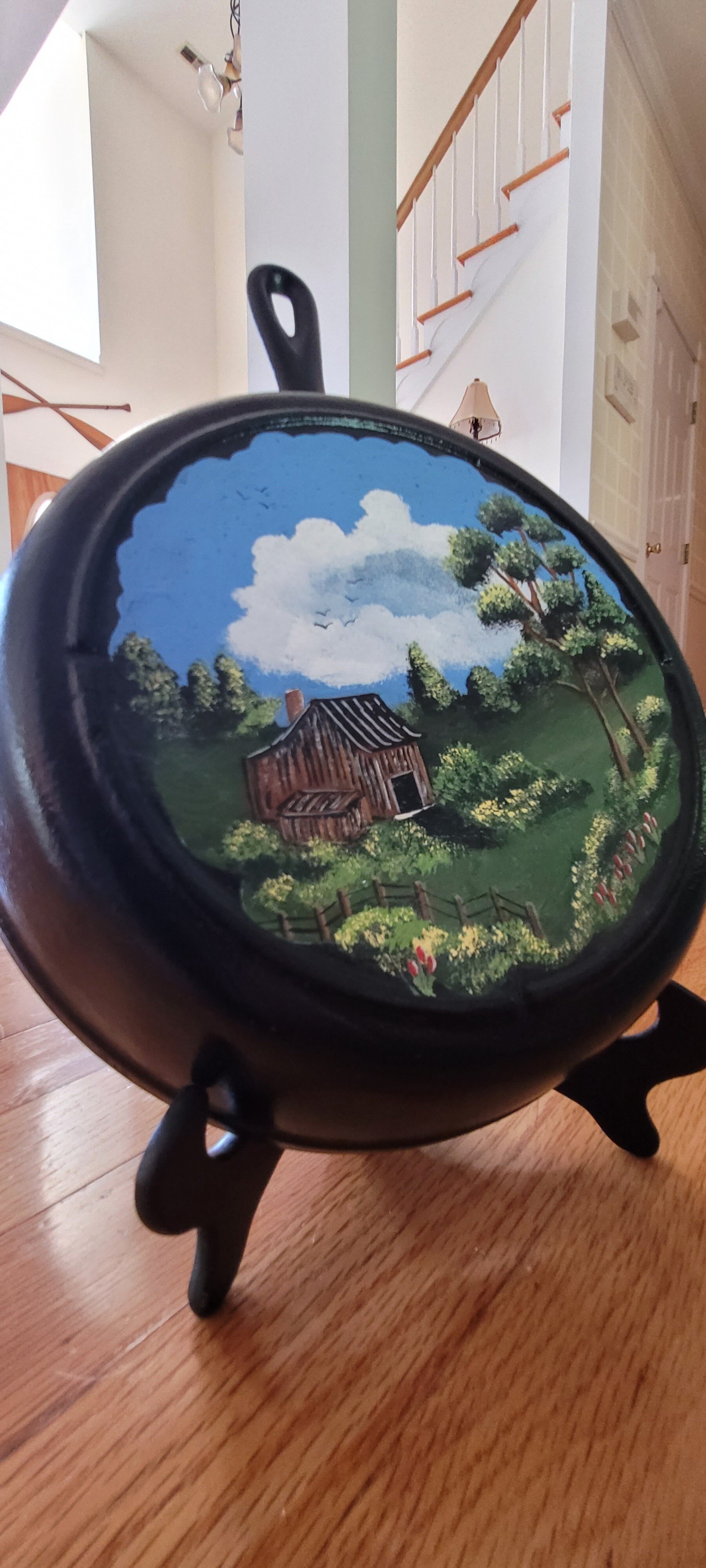
Gallery Artwork and Such
One of a kind pieces of artwork created on single antique or historic canvases connected to Charleston, South Carolina and the surrounding areas.
McLeod Plantation Vintage Cast Iron Frying Pan
McLeod Plantation Vintage Cast Iron Frying Pan
- An idyllic view set just off the road on James Island. And our newest GALLERY piece!
- Hand-painted Vintage Lodge Cast Iron Frying Pan (Circa 1960s) Locally Used and Sourced in South Carolina.
- This is a one-of-a-kind piece decorated with acrylic paints.
- DECORATIVE USE ONLY
A Brief History of McLeod Plantation
This little 37-acre seaside plantation situated on Wappoo Creek off the Ashley River and across the bank from the grand peninsular Charleston has seen all the changes throughout the years and continues to do so today…
In 1851, William Wallace McLeod acquired McLeod Plantation. It was even referred to as "Pick-Pocket Place" due to its unsuccessful attempts to produce cotton in the earlier nineteenth century! He had no heirs, but in 1990 willed ⅓ of the Plantation to the Charleston Historic Society, and thus began the back and forth of what would become of the plantation. For a time, it was to be purchased by the College of Charleston but there was much opposition due to the original nature of the site. In 2011, Charleston County Parks & Recreation purchased the land and began restoring it to its current heritage site today.
The Georgian-style plantation house (constructed in 1858) still remains along with the six clapboard slave cabins, a pre-Civil war gin house—used in cotton production, a dairy building, a barn, a detached kitchen, and a carriage house. At the center of its bountiful grounds, sits the grand oak tree, simply referred to as the McLeod Oak, which has spread its branches for well over 620 years. Additionally, there is an oak avenue that has formed an almost tunnel-like structure, which can be walked under, with the oak trunk on one side and its grand branches swinging overhead and touching down to the earth on the other side.
This culturally enriched site is remarkably important in the preservation and portrayal of the Geechie & Gullah heritage. Notably important to its design and landscape is the outside pavilion on the water—home to several kinds of grass used in making sweetgrass baskets—and is protected and preserved in an effort to keep the Gullah art tradition of sweetgrass basket-making alive.
Once a functioning plantation (after "Willie" was set in charge) with the main crop of sea island cotton, McLeod Plantation is the living, breathing, embodiment of all those who labored over the years in their efforts of achieving justice, freedom, and equality for not only themselves but also their lineage. Today it is a tribute and symbol of everything that was toiled for all those years, a South Carolina National Heritage Corridor & Historic Site, sharing the stories of both the enslaved and free peoples who lived at McLeod Plantation. This tangled past, after extensive in-depth research and countless hours of exploration into the lives of these individuals and their descendants, is laid before us and shared by way of stories and the like. It unfolds the past which has made its way and shaped who we are as a people, a community, a city, a Lowcountry area, and even a country today.
McLeod plantation was strategically important during the Civil War. In 1780, during the American War of Independence, British General Sir Henry Clinton planned his siege of Charleston from the very same original house standing today. This encouraged many of the enslaved people to join the war attempts. The house was even used as a hospital during the Civil War. After the British evacuation from Charleston in 1865, the free black Massachusetts 55th Volunteer Infantry occupied the site, playing a key role in emancipating enslaved people. And, later, the Freedmen’s Bureau held its offices at McLeod Plantation.
This site bears witness to the residents' "struggle for many freedoms-- personal, cultural and political-- enacted over the centuries" and "provides new insights to anyone interested in American history" and the Geechie/Gullah traditions of the Lowcountry.
~ Kristen Granet














